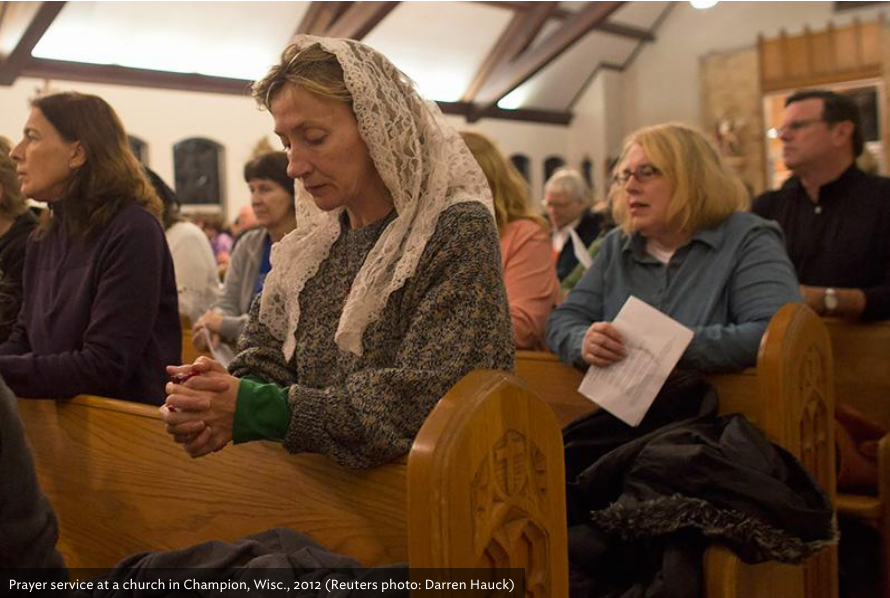Honesty is a wonderful thing. Last week, during an interview with Terry Gross, New York Times executive editor Dean Baquet made a welcome confession:
I want to make sure that we are much more creative about beats out in the country so that we understand that anger and disconnectedness that people feel. And I think I use religion as an example because I was raised Catholic in New Orleans. I think that the New York–based, and Washington-based too, probably, media powerhouses don’t quite get religion. We have a fabulous religion writer, but she’s all alone. We don’t get religion. We don’t get the role of religion in people’s lives. And I think we can do much, much better. And I think there are things that we can be more creative about to understand the country.
Baquet is right. If you don’t “get” religion, you can’t understand our country or the world. And yet, reporters and pundits too often cover religion badly, if at all.
The original sin of religion reporting is the failure to believe what religious people say. There’s always an “other” reason for their actions.
In much coverage of American Christianity, this mindset is obvious: You believe that God ordained marriage as the union of a man and a woman? Well, that’s just bigotry in search of a belief system, religion wielded as a club against the marginalized.
Our nation has consistently misunderstood the challenge posed by jihadist terror, too, in part because our secular leaders and reporters often don’t believe jihadists mean what they say. Too many in the mainstream press believe jihadists are mainly motivated by resentment of colonialism, or by anger over the Iraq war, or by American support for Israel, rather than by the deep and ancient desire to spread fundamentalist Islam across the entire world.
The second sin of religion reporting is believing that ideological inconsistency and moral failings expose the bankruptcy of religious reasoning or the illegitimacy of religious identification.
A fundamental tenet of the Christian faith is the notion of “original sin,” or man’s fallen nature. We all sin. We all fall short of the glory of God. That’s not hypocrisy, but humanity. The presence of sin isn’t proof that a person doesn’t really believe; it’s simply proof that a person has failed, as people do. Yes, there are some who don’t truly believe and exploit believers for profit, but that’s a small minority. Even the great, failed televangelists of the past, men such as Jimmy Swaggart and Jim Bakker, weren’t closet atheists but believers corrupted (as many believers are) by the notion that their self-interests advanced God’s kingdom.
In the world of jihad, sin and failure can make a man more dangerous. Jihadist ranks are filled with drug and porn addicts, men who live lives very different from the media stereotype of the devout holy warrior. But while they visit prostitutes and frequent strip clubs, they also retain a belief that they can still inherit paradise in one glorious act of martyrdom. Indeed, their hedonism can empower their jihadism. Jihad is their only way to glory.
A reporter doesn’t have to be religious to ‘get’ religion.
Then there’s the third sin: the belief that a good Google search or a quick Wikipedia read transforms a reporter into a theologian. Few things are more irritating than the argument that, “If you really believed the Bible then you’d . . . ” followed by a theological interpretation of such profound stupidity that you’d be embarrassed for the reporter if he or she had an ounce of shame.
Finally, in spite of the enormous diversity of human experience, there are still those (even in the ranks of reporters and pundits) who believe that all religions basically teach the same things. Experience with Evangelicals and jihadists most clearly shows the distinctions. Evangelicals represent one of America’s most generous and charitable communities. But for Mormons, they’d be the most generous. Christians follow a God who gave his life on a cross. Jihadists follow a warlord, and they’re generous mainly with the sword.
A reporter doesn’t have to be religious to “get” religion. I’ve known atheists who understand Christians quite well. But in my experience, secular reporters are selectively credulous. They’ll accept at face value a secular activist’s motivations and question their sincerity only when presented with evidence of opportunism. But when it comes time to extend the same charity to a Christian, they either can’t or won’t discard their skepticism that he truly believes the tenets of a faith that they find to be repressive nonsense.
In the 2016 election, white Evangelicals voted overwhelmingly for Trump. While some Evangelical leaders were certainly corrupted to a degree by the pursuit of power and their hatred for Hillary Clinton, the vast majority voted for Trump because they saw the Democratic party standing squarely in opposition to their deepest beliefs. Evangelicals may have been a cheap date, but at least Trump wanted them in his car. The wisdom of this reasoning can and should be debated. The concerns that motivated so many Evangelicals to adopt it, however, were entirely real and entirely warranted.
This is why the culture war — and the war against violent jihad — will never go away. If an individual perceives that his most important and sacred beliefs are at stake, he simply will not relent. Surrender is not an option when the human soul hangs in the balance.
Source: David French, nationalreview.com
 Listen Online
Listen Online Watch Online
Watch Online Find a Station in Your Area
Find a Station in Your Area








 Listen Now
Listen Now Watch Online
Watch Online
